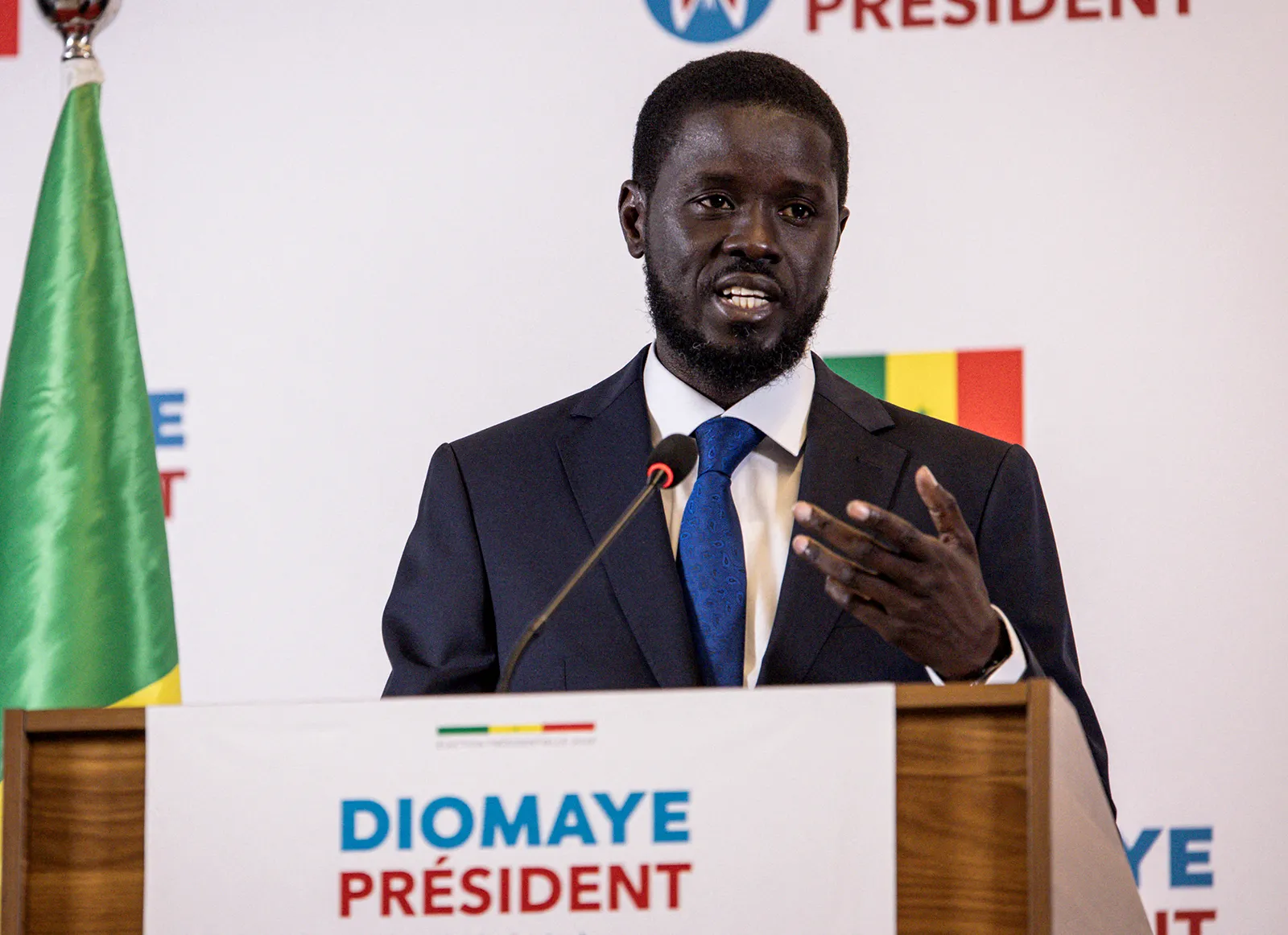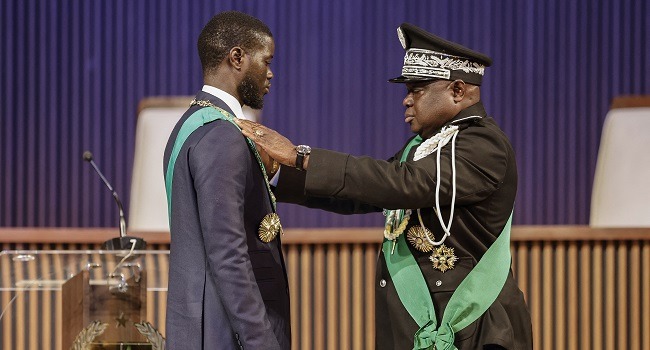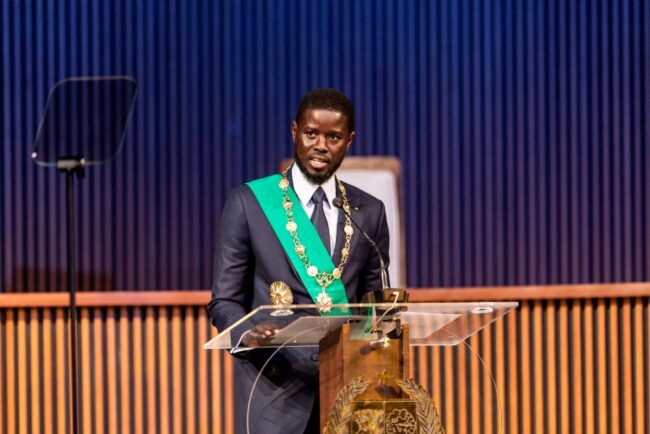
Senegal’s 5th Presidency—An Overview
The simple but historic handing over ceremony from President Macky Sall to President Bassirou Diomaye Faye, the new President of Senegal, on April 2, 2024, appears emblematic of a looming profound change in that country. This is not to undermine the fact that there have been remarkable changes at specific intervals in the country’s political firmament since her independence in 1960.
To begin with, Senegal has maintained an enviable record of never having tasted military rule, even when most of West Africa and particularly her neighbours, were all enmeshed in military dictatorships. True, the country did have a one-party system (described by some political observers as ‘a civilian form of military dictatorship’), dominated by the Socialist Party of Senegal, but the transformation imposed on the world by Mikhail Gorbachev’s twin policies of perestroika and glasnost (openness and change)—impacted on the cold war, lessened its negative effects and consequently unleashed unprecedented change on the politics of many countries as superpower rivalry eased—and did not leave Senegal out.
Multi-party democracy thus came to Senegal and cracked the hold of the Socialist Party on the country’s politics. It may not have eroded the impact of the nearly 40-year rule of that party on the country, but it found a good basis on which to thrive, as it helped to entrench party discipline and respect for political values among politicians in Senegal.
Poet and politician Leopold Sedar Senghor, whose famous poem on ‘Negritude’ remains an iconic and fitting expression of the reflections of the literary movement of the mid-20th Century that opposed French colonial rule and policy of assimilation, would be elected first president of Senegal at a most auspicious time in its post-colonial history (from 1960 to 1980). His Socialist Party of Senegal remained the only party in the country for almost 40 years. That was the party that had sought for the independence of Senegal and won the spoils of office after freedom came.
Senghor had been succeeded by President Abdou Diouf (January 1, 1981 to April 1, 2000), who ruled for 19 years before the benefits of the end of the Cold War ushered in democratic changes in the country’s political landscape that saw serial Presidential candidate, Abdoulaye Wade of the Senegalese Democratic Party, ousting the 39-year old reign of the Socialist Party in the country’s next election. That was surely and unarguably a new dawn and the harbinger of multi-party politics in Senegal.
President Macky Sall and his legacy
President Macky Sall replaced President Wade, when he led his Alliance for the Republic Party to another historic win in the country’s presidential poll, in an election that returned the third political party to wrest power after the long spell of the Socialists. He ruled from April 2, 2012 to April 2, 2024 and his tenure has returned some definitive and remarkable results.
Sall’s tenure was largely progressive and impactful, both for the Senegalese, for West Africans and for the African continent. He built on the gains of the Mbeki-Mkapa-Obasanjo-Wade legacy at the level of the continent by sustaining the gains of the New Partnership for Africa’s Development (NePAD) launched by the African Union (AU) and consolidated the Kuffour-Obasanjo-Wade firm resistance to military coups in West Africa consistent with the dictates of the Economic Community of West African States (ECOWAS) by deploying Senegalese soldiers, in concert with former President Muhammadu Buhari, in the vanguard of the ECOMIG mission that ousted recalcitrant President Yayyah Jammeh of The Gambia (who, after losing an election and publicly conceding defeat, suddenly refused to take his exit from power). Sall left for the Senegalese, major infrastructure projects dominated by an impactful rail system, major airports and an enviable improvement in the social sector.
He also re-organised the Senegalese military, particularly by launching an ambitious effort to build a blue water navy—something unheard of in former French colonies where Paris has a track record of stifling any attempt by those erstwhile colonies to have capable and independent military forces able to function without the control and influence of France.

Sall, political crisis and Thabo Mbeki’s intervention
However, it was also under Macky Sall that the checkered political history of Senegal was almost being soiled by the rash of imprisonments that occurred in the build up to his last year in office. It saw popular opposition figures like Ousmane Sonko and Bassirou Faye (now Prime Minister and President respectively) jailed. Sonko, a very popular trade unionist, had challenged President Sall for power in the 2019 election and lost, when the party he formed—the African Patriots of Senegal for Labour Party (PASTEF) put up a commendable showing, coming third in those polls and selling itself largely to the young population of voters.
Sonko had transformed himself and the party into a formidable opposition platform against the ruling party, further cementing his support base among young Senegalese. Faye joined the party and became one of its leaders and following the arrest of Sonko, he would become its Secretary General, continuing the struggle begun by Sonko. His comments on the conduct of some of the Magistrates who had tried Sonko landed him in trouble, leading to his being jailed on contempt charges. The Senegalese Constitutional Court would convict Sonko and with that conviction, the party leadership picked Faye to run as an independent in the 2024 elections.
The postponement of the elections by President Macky Sall caused widespread outcry from within and outside Senegal, even though the reason he gave was that the disqualification of some candidates for that election needed to be resolved before the elections. Amongst those who advised him to navigate away from the political crisis and to secure his legacy was President Thabo Mbeki, former South African leader. Political opponents would subsequently be freed, even if just a few weeks to the national elections. Thus, the eventual release of Faye and Sonko from jail and the former’s resounding victory (winning an unbelievable 54.28% in an over-populated field of some 19 presidential candidates, which included the anointed successor of the ruling party), catapulted the PASTEF candidate into power.
The conduct of the March 24 elections once more affirmed the maturity of Senegalese citizens, election officials and politicians. The 18 presidential candidates who lost to Faye immediately conceded to him within hours of the announcement of his victory, setting the stage for the commencement of what could turn out to be a most auspicious phase of the country’s political history.

President Faye’s likely direction in domestic policy and regional diplomacy
President Bassirou Faye promoted the manifesto of PASTEF, whose key points include the fight against corruption, instituting monetary reforms, reviewing mineral licenses and whittling down the overbearing influence of France in Senegalese affairs.
With the crippling economic challenges globally and in the sub-region, Faye has his work cut out for him. He will have to strive much harder if he would successfully dismantle an overbearing French influence in virtually every aspect of Senegal’s socio-economic, political and military life. The civil service of his country is decidedly pro-France in orientation and training and this would further impose profound additional challenges of its own in the execution of the reform he seeks.
Beyond Senegal, he is likely to find allies within the military regimes in Burkina Faso, Mali and Niger as he seeks to extract from France, equitable terms of trade and conditions for the Senegalese economy. According to the Observatory of Economic Complexity (OEC), in 2022, Senegal exported produce worth $92M to France, comprising of “Non-fillet Fresh Fish ($10.3M), Fish Filets ($6.48M), and Clays ($5.43M).” It also revealed that the last 27 years has witnessed a continuous annual in export at a rate of 2.75%, from $196M in 1995 to $92M in 2022.
On the other hand and in the same period, France exported produce worth USD 1.11 billion to Senegal, comprising of “packaged medicaments ($214M), wheat ($106M), and copper wire ($24.7M).” In contrast to decreasing Senegalese exports, French exports have been increasing over the same period “at an annualised rate of 3.39%, from $451M in 1995 to $1.11B in 2022.”
Perhaps President Faye may have no problem de-coupling Senegal from one-sided trade relations with France, given the fact that already, in 2022, his country imported a total of USD4 billion worth of goods from China (according to the UN COMTRADE database). In return, the same source credits Senegal with exporting produce worth USD 228.15 million to China—twice her exports to France. The critical issue though in trade relations between both countries is quite broad and has at its core, central banking procedures and deposit of foreign reserves.
The question is, how will France receive the shift in policy proposed by the new rulers in Dakar? That new shift in policy, should he navigate it well, may eventually compel Côte d’Ivoire, a staunch French ally in the region, to pitch in with these countries in seeking a re-definition of the terms and conditions of their collective commercial engagement with the erstwhile colonial power.
The direction and flow of Senegal’s economic interests under a new President may compel France to also review its own relations with these countries, especially since she has come under criticisms not just from many young Africans, but also from some of her European member-States who have continued to decry the continuous exploitation of Africa by Paris.
It is unlikely that President Faye would reduce the commitment of his country to ECOWAS, under the current leadership of President Bola Ahmed Tinubu of Nigeria, where Senegal is not only a founding member, but now has perhaps the best credential of all member-States as a well-defined democratic nation and therefore able to drive democratisation of the sub-region. Indeed, his election in a free, fair and credible election is a challenge to Burkina Faso, Mali and Niger who are steeped in military rule and serves to challenge them to revert to democratic norms as demanded by the sub-regional body.
Faye will inherit a strong military force and the fledgling Senegalese Navy that Macky Sall has begun to build, with a complement of three missile capable ships—perhaps the most formidable today in the whole of West Africa. As has been the tradition of his country, it is expected that he will continue to put that military at the disposal of both ECOWAS and the African Union (AU) to promote peace and stability on the continent and protect the Gulf of Guinea within West and Central Africa.
In this way, it is expected that the Senegalese and Nigerian Armed Forces will continue to strengthen their cooperation and collaboration towards protecting West Africa and strengthening the capability of ECOWAS to enforce some of its decisions in the domain of peace and security within the sub-region.
Conclusion
Without any doubt whatsoever, a lot is being expected from the new leadership in Dakar. Alongside that expectation, the election of President Faye goes a long way to strengthen Senegal’s credentials as one of the foremost democratic nations in Africa, in the league of countries like Botswana. It enables the country to showcase other positive attributes and values that she has to share with the rest of the continent, as not only has she elected one of the youngest ever leaders in the world, but has chosen him in a free, fair and credible process.
Young people, who make up a substantial majority of the population on the continent, can look up to Senegal and see hope for themselves in being part of a critical decision-making process that will determine how their lives will run and in even being elected to superintend over that process.
Senegal can also respectfully hold up her credential as a tolerant society in which religion is not as divisive as it has become in other countries given that she has so far avoided being engulfed in a dogma-inspired insurgency like some countries in the sub-region. With regard to strengthening social harmony and cohesion, it is inspiring to recall that its former President, Sedar Senghor was a Christian, President Abdul Diouf’s wife is a Christian and one of Faye’s own wives is also a Christian.
_______________________
Adebayo Olowo-Ake has vast experience in the media, private sector (corporate affairs & planning), policy work in a Think Tank and service as a Special Adviser to Governor Gbenga Daniel in Ogun State in his first term.
He also undertook Public Communication/ Relief Operations and Humanitarian Diplomacy with the International Committee of the Red Cross (ICRC), working in contexts impacted by armed conflict and complex disasters in different parts of the world.
He has thus garnered rich professional experience that translates into a comprehensive blend of crisis communications, active engagement in relief operations, conduct of humanitarian diplomacy and leading domestication processes of related international treaties.
From 2002 to 2022 in particular (except for 2 years), he worked to promote international humanitarian law in conflict areas and generated strategic analysis at premeditated intervals as the end product of sustained trend monitoring to inform decision-making at the country and sub-regional level and often in the midst of crisis. In what is increasingly being described as the technical diplomatic space, he rose to the position of Deputy Head of Regional Delegation, having previously served in many capacities, including as Communications Delegate, Communications Coordinator and Communications Adviser, all while with the ICRC.
Among others, he led public communication efforts for the inaugural (and follow up) edition(s) of the famed “Enable Makeathon” global humanitarian hackathon held in Bengaluru, India and domestication of key international treaties in 5 States, including one accession process.
He is experienced in engaging with States, Parliaments and multilateral bodies/ international organisations on important policy and diplomatic issues to elicit their action and effective contribution towards furthering global humanitarian action. He has also written or edited policy papers and specialised publications.
Adebayo’s deployment to missions in Africa, Asia, Europe and the Middle East gifted him with the requisite exposure and experience that have influenced his growth and development, causing him to emerge as a more matured leader with enhanced skills and knowledge, an improved team player and a better human being.
He is interested in: Development; Humanitarian Diplomacy; Global Affairs; IHL; Conflict Transformation & Post-Conflict Reconstruction
Contact details/Social Media handles:
https://www.linkedin.com/in/adebayo-olowo-ake-23994515
























































 EduTimes Africa, a product of Education Times Africa, is a magazine publication that aims to lend its support to close the yawning gap in Africa's educational development.
EduTimes Africa, a product of Education Times Africa, is a magazine publication that aims to lend its support to close the yawning gap in Africa's educational development.


